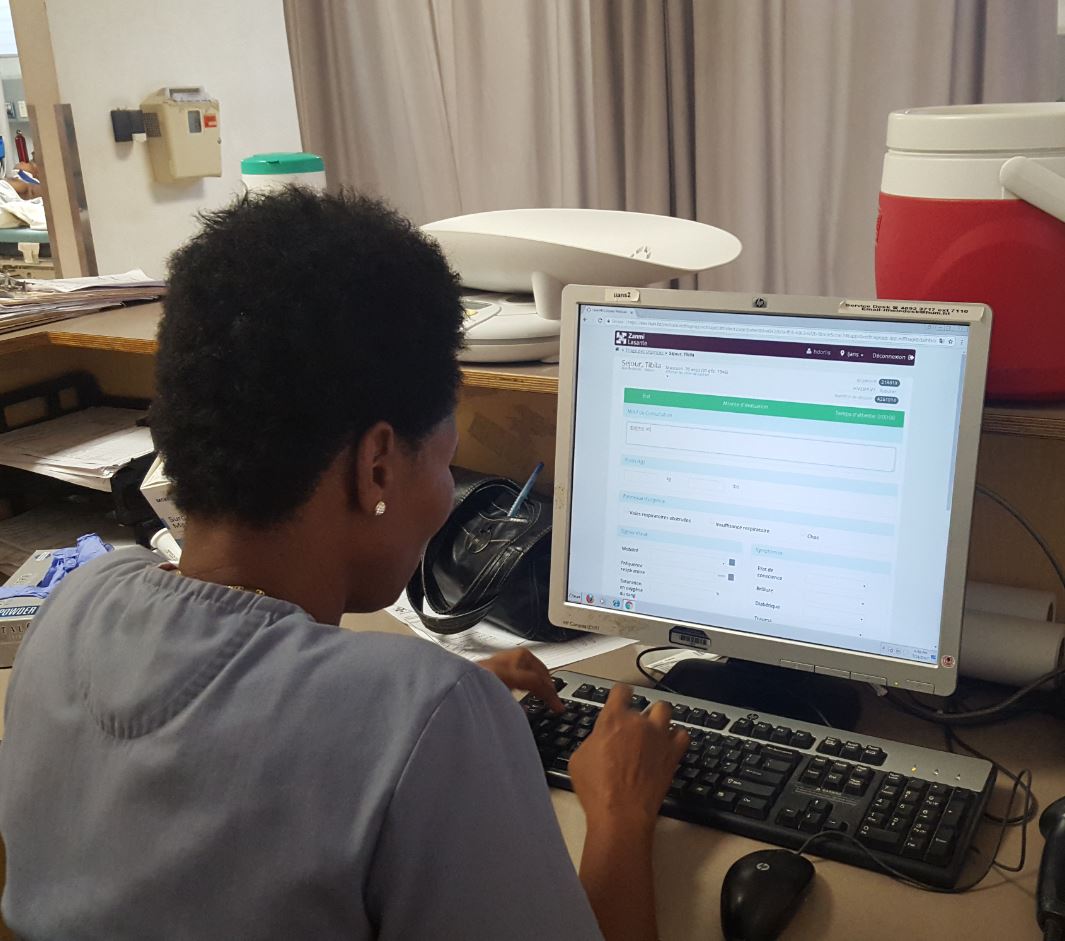
Imagine walking into a crowded emergency room and having your symptoms recorded electronically, in order to minimize wait time and maximize care. That efficient scenario — a dream of hospitals everywhere — is newly underway at a hospital in Haiti.
In 2015, Boston, Mass.-based Partners in Health (PIH), which runs University Hospital in Mirebalais, Haiti, set out to develop an electronic triage system to replace its paper-based process. Their strategy was to expand on OpenMRS, the open-source medical record system implemented there. But this being relatively new territory for the PIH team, they sought additional experts to get the job done.
Tapping into a Learning Community
Enter Bill Gribbons, a leading authority on user experience who directs the Master’s in Human Factors in Information Design (HFID) at Bentley University. PIH contacted Gribbons, who then reached out to his extensive network — he calls it a learning community — and received a flood of interest. He recruited another faculty expert, Roland Hubscher, to help advise a team, and four part-time graduate students eager for hands-on experience and excited to make a difference. All were willing to work on the project remotely, for no pay and no course credit.
“I firmly believe some of the most meaningful learning happens outside the confines of a traditional classroom,” said Gribbons. “This type of project, one that requires in-depth involvement and makes an immediate impact on a product, is invaluable for students — particularly for graduate students, who are looking to grow their careers and stand out in a crowded marketplace.”
The HFID students were located in different cities and time zones and came from different professional backgrounds. Kim Forthofer, the team lead, was in Southwest Harbor, Maine, Mary Gribbons in Cambridge, Mass.; Truc Tokarz in San Jose, Calif.; and Dan Lopes in Toronto, Ontario. Though they were not able to work on site in Haiti, they used Google Hangouts to meet as a group on Wednesday evenings to stay on track.
“We looked to Bentley because we knew that their graduate students would be accountable for their work and thoughtfully execute this project,” said David DeSimone, business analyst at PIH. “The students did not disappoint. They asked all the right questions and delivered a product that was immediately well received.”
Designing a Product that Makes a Difference
Designing an electronic emergency intake form, from a remote location, is no easy task. The requirements were that the form permit easy scanning by a nurse and visually signal the urgency of a patient’s medical needs. To begin, University Hospital sent its typical paper intake forms to the Bentley team for analysis. This system, which ranked patients with a numerical score and a color based on severity, left plenty of room for mathematical error.
In addition to the technical parameters, cultural considerations were also essential. “One of the biggest challenges for the team was coming up with a user-friendly design for a population that has limited access to computers,” said DeSimone. “Their initial designs used a keyboard only, with no mouse. But by the time we implemented the technology, we were able to train the nurses on Google Chromebooks.”
A significant part of the design process involved user surveys and user testing. Due to the distance and lack of readily available technology, the Bentley team designed static mockups and used a “cognitive walkthrough” exercise where they asked nurses to role-play a patient-intake scenario.
“This helped us better understand the human thought process behind the product’s use,” said Forthofer. “We knew it was possible that lives could depend on nurses understanding the new app as quickly as possible.”
Life-Changing Experience
Despite the lack of credit or pay, the experience of acting as consultants had enormous value for the team. They improved the hospital experience for patients in Haiti, while also building their own skills and putting them into practice.
“The project was much more like a real consulting gig instead of a ‘realistic’ project done over a semester and graded by a professor. This provided us with real-world pressure as well as real-world confidence and experience,” said Forthofer, who also gained reinforcement that she is in the right career, for the right reasons. “I began my professional life as an environmental engineer and user experience is a second career for me, so challenges related to technical and scientific areas are the ones I continue to be drawn to.”
This venture is a first for Partners in Health, in terms of developing a product that triages patients electronically in real time. They hope the intake form will be replicated at other facilities in Haiti and elsewhere. Anecdotally, they know that emergency room waiting times are lower and, more important, that prioritization has improved so the most critical patients are seen first. PIH has plans to gather data on the product’s effectiveness, but in the meantime, patients are getting better care and nurses and doctors are better able to do their jobs - a winning prescription all around.
Dedicated to Preparing a New Kind of Business Leader
Bentley University is one of the nation’s leading business schools, dedicated to preparing a new kind of business leader with the technical skills, global perspective and ethical standards required to make a difference in an ever-changing world. Bentley’s diverse arts and sciences program combined with an advanced business curriculum prepares graduates to make an impact in their chosen fields. The university enrolls approximately 4,000 undergraduate and 1,000 graduate students. The Princeton Review ranked Bentley #1 in the United States in both career services and internships and Bloomberg BusinessWeek ranked Bentley a top 10 undergraduate business school.

